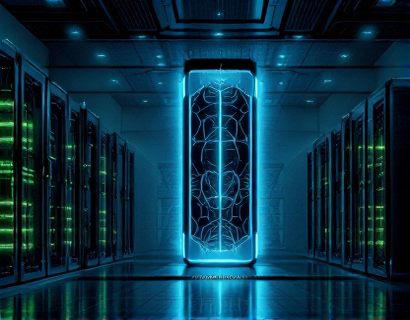Blockchain-Enabled Registry Software: Revolutionizing Data Management
In an era where data integrity, security, and efficiency are paramount, the traditional methods of registry management are being redefined. Blockchain-enabled registry software emerges as a transformative solution, offering unparalleled advantages to professionals and enthusiasts across various sectors. This article delves into the intricacies of how blockchain technology is revolutionizing data management, providing enhanced security, transparency, and efficiency. Whether you are a data security advocate, a registry management professional, or a digital transformation leader, understanding the potential of blockchain-enabled registry software is crucial for staying ahead in the digital landscape.
Understanding Blockchain Technology
Before exploring the applications of blockchain in registry management, it's essential to grasp the fundamental concepts of blockchain technology. At its core, a blockchain is a decentralized digital ledger that records transactions across multiple computers in such a way that the registered transactions cannot be altered retroactively. This technology ensures transparency, immutability, and security, making it an ideal solution for managing sensitive and critical data.
Blockchain operates on a network of nodes, each maintaining a copy of the entire ledger. When a new transaction is initiated, it is broadcast to the network, where it is verified by nodes through complex algorithms. Once verified, the transaction is grouped with other transactions in a block, which is then added to the chain in a linear, chronological order. Each block contains a cryptographic hash of the previous block, a timestamp, and transaction data, creating an unbreakable link and ensuring the integrity of the entire chain.
Enhanced Security in Registry Management
One of the most significant advantages of blockchain-enabled registry software is its ability to enhance security. Traditional registry systems are often centralized, making them vulnerable to cyber attacks, data breaches, and unauthorized access. In contrast, blockchain's decentralized nature distributes data across a network, eliminating single points of failure and significantly reducing the risk of security breaches.
The cryptographic techniques used in blockchain ensure that once data is recorded, it cannot be altered without consensus from the majority of the network. This immutability feature provides a high level of trust and reliability, as any attempt to tamper with the data would be immediately detected and rejected by the network. For professionals managing sensitive information such as land records, legal documents, or identity verification, this level of security is invaluable.
Transparency and Traceability
Transparency is another cornerstone of blockchain technology, and it plays a crucial role in registry management. Every transaction on a blockchain is recorded in a transparent manner, allowing all participants to view the entire history of the data. This transparency fosters trust among stakeholders, as they can verify the authenticity and integrity of the information at any point in time.
In traditional registry systems, traceability can be a challenge, with data often siloed and difficult to track. Blockchain-enabled registry software provides a comprehensive and immutable record of all transactions, enabling users to trace the history of any data point with ease. This feature is particularly beneficial in industries such as supply chain management, where tracking the origin and movement of goods is essential for ensuring quality and compliance.
Efficiency and Automation
Blockchain technology not only enhances security and transparency but also improves the efficiency of registry management processes. Smart contracts, self-executing contracts with the terms directly written into code, automate and enforce contractual obligations without the need for intermediaries. This automation reduces manual errors, speeds up processes, and lowers operational costs.
For instance, in property registry management, smart contracts can automate the transfer of ownership once all conditions are met, such as payment and verification of documents. This streamlines the entire process, from initiation to completion, reducing the time and resources required. Similarly, in academic credentialing, blockchain can verify and validate degrees and certifications instantly, eliminating the need for manual checks and reducing fraud.
Case Studies and Real-World Applications
The potential of blockchain-enabled registry software is being realized across various industries. In the real estate sector, platforms like Propy use blockchain to create a decentralized property registry, allowing buyers and sellers to transact directly and securely. This not only reduces the need for intermediaries but also ensures that property records are tamper-proof and easily verifiable.
In the healthcare industry, blockchain-based patient records management systems are being developed to ensure the secure and private sharing of medical information. These systems allow patients to control access to their data while providing healthcare providers with a reliable and transparent source of information. This enhances patient care and reduces the risk of data breaches.
Government agencies are also exploring the use of blockchain for registry management. For example, Estonia, a pioneer in digital governance, has implemented a blockchain-based identity verification system that ensures secure and efficient access to public services. This system not only enhances security but also improves the user experience by providing a seamless and trustworthy service.
Challenges and Considerations
While the benefits of blockchain-enabled registry software are clear, there are several challenges and considerations that organizations must address. One of the primary concerns is scalability. Blockchain networks, especially public ones, can face performance issues as the number of transactions increases. However, advancements in blockchain technology, such as sharding and layer 2 solutions, are addressing these scalability challenges.
Another consideration is the regulatory landscape. As blockchain technology is relatively new, regulatory frameworks are still evolving. Organizations must navigate these regulations carefully to ensure compliance while leveraging the benefits of blockchain. Collaboration with regulatory bodies and staying informed about changes in legislation is crucial.
Additionally, the adoption of blockchain-enabled registry software requires a shift in mindset and processes. Organizations must invest in training and education to ensure that their teams are equipped to handle the new technology. This includes understanding the technical aspects of blockchain and integrating it into existing workflows.
Future Trends and Innovations
The future of blockchain-enabled registry software is promising, with ongoing innovations set to further enhance its capabilities. Interoperability between different blockchain platforms is becoming a focus, allowing for seamless data exchange and integration. This will enable more comprehensive and connected registry systems, breaking down silos and fostering collaboration across industries.
Another area of innovation is the integration of blockchain with other emerging technologies such as the Internet of Things (IoT) and artificial intelligence (AI). IoT devices can generate and record data on the blockchain, ensuring authenticity and traceability. AI can be used to analyze blockchain data, providing insights and automating decision-making processes.
Furthermore, the development of private and consortium blockchains is addressing some of the scalability and privacy concerns associated with public blockchains. These tailored solutions offer the benefits of blockchain while providing more control and efficiency for specific use cases.
Conclusion
Blockchain-enabled registry software represents a significant leap forward in data management, offering enhanced security, transparency, and efficiency. By leveraging the unique properties of blockchain technology, organizations can transform their registry processes, build trust, and stay competitive in a rapidly evolving digital world. Whether you are a professional in registry management, a security advocate, or a digital transformation leader, embracing blockchain-enabled solutions is a strategic move towards a more secure and efficient future.










































